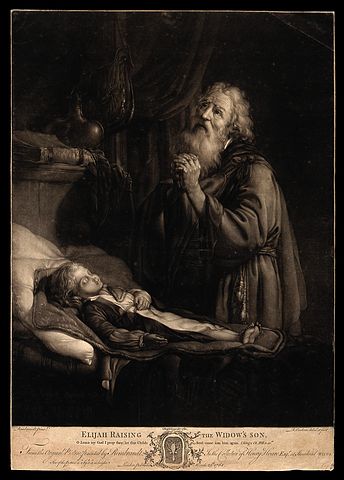vs. Dr. Lydia McGrew

Dr. Lydia McGrew is an Anglican philosopher and author, with a very impressive Curriculum Vitae, and she is a respected friendly acquaintance. She wrote an article, “For All Saints and All Souls: Speak of me always to Maleldil” on 1 November 2014. I responded to it and related comments from her, in my article, Dialogue with an Anglican on “Praying to Mary,” Patron Saints, Etc. (11-10-14). I would like to now reply more extensively to one of the major points of disagreement, that she repeatedly expressed, since subsequent biblical research that I have undertaken offers, I think, additional insight about her point of contention.
Her words from our dialogue will be in blue.
*****
I also disagree with the idea, which I have often seen expressed by Catholics, that certain dead saints have special influence with God the Father or with Jesus Christ . . ., so that by going to them we are making our prayers more efficacious than they otherwise would be. This conveys a notion that seems to me theologically false and even unsavory–namely, a notion of needing to be “in with the in crowd” theologically rather than being loved fully by Our Lord oneself and being able and encouraged to approach Him directly with one’s petitions. . . .
Look at your own analogy of levels of bosses and asking an intermediate-level boss to get a raise for us. Is that how we should think of God and our relationship to him? And the author of Hebrews (Hebrews 4:16) tells us to come boldly to the throne of grace and emphasizes throughout the book that, the old covenant being at an end, we need no human intermediary other than the Lord Jesus himself. These verses and others (the Lord’s prayer itself, for example) encourage believers to strive for a directness and intimacy in their relationship with God . . .
I think that the father would be rightly hurt if a son said that he asked his brother to make a request on his behalf because he thought the brother a favorite and wanted the brother to help him by “getting it for him.” . . .
The whole point of the request to the intermediary in those analogies is that that person is asking for you, instead of your asking yourself. . . .
For example, consider the verses in James. I’m rather intrigued by the fact that you seem to think that those verses do teach that we should go to those intermediaries (e.g., the elders of the church) rather than praying on our own behalf. I would call this a type of biting the bullet. I would say that this demonstrates that our disagreement comes at the level of what degree of intimacy should obtain between Christians and God. They absolutely do not mean that we should ask the righteous man to pray for us instead of praying for ourselves.
“Please Hit ‘Subscribe’”! If you have received benefit from this or any of my other 4,900+ articles, please follow my blog by signing up (with your email address) on the sidebar to the right (you may have to scroll down a bit), above where there is an icon bar, “Sign Me Up!”: to receive notice when I post a new blog article. This is the equivalent of subscribing to a YouTube channel. My blog was rated #1 for Christian sites by leading AI tool, ChatGPT: endorsed by influential Protestant blogger Adrian Warnock. Actually, I partner with Kenny Burchard on the YouTube channel, Catholic Bible Highlights. Please subscribe there, too! Please also consider following me on Twitter / X and purchasing one or more of my 55 books. All of this helps me get more exposure, and (however little!) more income for my full-time apologetics work. Thanks so much and happy reading!
***
My reply to this is simply summed up: the Bible teaches otherwise, particularly and most undeniably in this passage:
James 5:14-18 (RSV) Is any among you sick? Let him call for the elders of the church, and let them pray over him, anointing him with oil in the name of the Lord; [15] and the prayer of faith will save the sick man, and the Lord will raise him up; and if he has committed sins, he will be forgiven. [16] Therefore confess your sins to one another, and pray for one another, that you may be healed. The prayer of a righteous man has great power in its effects. [17] Eli’jah was a man of like nature with ourselves and he prayed fervently that it might not rain, and for three years and six months it did not rain on the earth. [18] Then he prayed again and the heaven gave rain, and the earth brought forth its fruit.
1 Kings 17:1 Now Eli’jah the Tishbite, of Tishbe in Gilead, said to Ahab, “As the LORD the God of Israel lives, before whom I stand, there shall be neither dew nor rain these years, except by my word.”
The Catholic position is that it’s best, and always possible, to “go straight to God” in prayer, unless there happens to be a person more righteous than we are in the immediate vicinity, who is willing to make the same prayer request. Then the Bible — not merely the Catholic Church — recommends that we ask them to intercede, rather than asking God directly. If someone wants to be biblical and to follow the biblical model of prayer and intercession, it would include this practice. I’ll now proceed to document that.
Anyone can go directly to God in prayer at any time. No Catholic who knows anything at all about their faith has ever stated otherwise, nor has the Catholic Church. But they can also choose to wisely ask a person holier than themselves to make a prayer request of God, because of the passage above, and others like, “the eyes of the Lord are upon the righteous, and his ears are open to their prayer” (1 Pet 3:12), and “When the righteous cry for help, the LORD hears” (Ps 34:17), and “the prayer of the upright is his delight” (Prov 15:8), and “he hears the prayer of the righteous” (Prov 15:29), and “we receive from him whatever we ask, because we keep his commandments and do what pleases him” (1 Jn 3:22), and “If I had cherished iniquity in my heart, the Lord would not have listened” (Ps 66:18; cf. 66:19-20).
Having established this principle of scriptural prayer, we see how it is carried out in the case of very holy people. God told Abimelech that Abraham would pray for him, so he could live, “for” Abraham was “a prophet” (Gen 20:6-7). “All Israel” (1 Sam 12:1) “said to Samuel [the prophet], ‘Pray for your servants to the LORD your God, that we may not die’. . .” (1 Sam 12:19). God told Job’s “friends”: “my servant Job shall pray for you, for I will accept his prayer not to deal with you according to your folly” (Job 42:8). Why did God listen to Job’s prayers? It’s because God Himself stated that “there is none like” Job “on the earth, a blameless and upright man, who fears God and turns away from evil” (Job 1:8). King Zedekiah asked the holy prophet Jeremiah to pray for him and the country (Jer 37:3; cf. 42:2: “[they] said to Jeremiah the prophet, ‘Let our supplication come before you, and pray to the LORD your God for us’ “).
If we go to a more righteous or holy person and ask them to pray for x, then x is far more likely to happen than if we go to God directly (because we are less righteous). Therefore, it’s more “efficient” and “better” to do this in these instances rather than go directly to God. Righteous people know God’s will better than those who are not following God with a whole heart, with all their might. Therefore, their prayers are more effective. Here are many more passages that teach this principle of prayer:
Exodus 32:30 On the morrow Moses said to the people, “You have sinned a great sin. And now I will go up to the LORD; perhaps I can make atonement for your sin.”
Numbers 11:1-2 And the people complained in the hearing of the LORD about their misfortunes; and when the LORD heard it, his anger was kindled, and the fire of the LORD burned among them, and consumed some outlying parts of the camp. [2] Then the people cried to Moses; and Moses prayed to the LORD, and the fire abated.
Numbers 14:11-13, 19-20 And the LORD said to Moses, “How long will this people despise me? And how long will they not believe in me, in spite of all the signs which I have wrought among them? [12] I will strike them with the pestilence and disinherit them, and I will make of you a nation greater and mightier than they.” [13] But Moses said to the LORD, “ . . . [19] Pardon the iniquity of this people, I pray thee, according to the greatness of thy steadfast love, and according as thou hast forgiven this people, from Egypt even until now.” [20] Then the LORD said, “I have pardoned, according to your word;
Numbers 21:6-8 Then the LORD sent fiery serpents among the people, and they bit the people, so that many people of Israel died. [7] And the people came to Moses, and said, “We have sinned, for we have spoken against the LORD and against you; pray to the LORD, that he take away the serpents from us.” So Moses prayed for the people. [8] And the LORD said to Moses, “Make a fiery serpent, and set it on a pole; and every one who is bitten, when he sees it, shall live.”
Deuteronomy 9:18-19 Then I lay prostrate before the LORD as before, forty days and forty nights; I neither ate bread nor drank water, because of all the sin which you had committed, in doing what was evil in the sight of the LORD, to provoke him to anger. [19] For I was afraid of the anger and hot displeasure which the LORD bore against you, so that he was ready to destroy you. But the LORD hearkened to me that time also.
Deuteronomy 10:10 I stayed on the mountain, as at the first time, forty days and forty nights, and the LORD hearkened to me that time also; the LORD was unwilling to destroy you.
1 Samuel 7:8 And the people of Israel said to Samuel, “Do not cease to cry to the LORD our God for us, that he may save us from the hand of the Philistines.”
1 Samuel 12:18-19 So Samuel called upon the LORD, and the LORD sent thunder and rain that day; and all the people greatly feared the LORD and Samuel. [19] And all the people said to Samuel, “Pray for your servants to the LORD your God, that we may not die; for we have added to all our sins this evil, to ask for ourselves a king.”
1 Kings 13:6 And the king said to the man of God, “Entreat now the favor of the LORD your God, and pray for me, that my hand may be restored to me.” And the man of God entreated the LORD; and the king’s hand was restored to him, and became as it was before.
2 Kings 6:18 And when the Syrians came down against him, Eli’sha prayed to the LORD, and said, “Strike this people, I pray thee, with blindness.” So he struck them with blindness in accordance with the prayer of Eli’sha.
2 Chronicles 30:18-20 . . . Hezeki’ah had prayed for them, saying, “The good LORD pardon every one [19] who sets his heart to seek God, the LORD the God of his fathers, even though not according to the sanctuary’s rules of cleanness.” [20] And the LORD heard Hezeki’ah, and healed the people.
Related Reading
“The Prayer of a Righteous Man Availeth Much” (James 5:16: KJV): What Does It Mean? Dialogue with a Lutheran (vs. Stuart Floyd) [6-8-05]
Biblical Evidence for Prayers of the Righteous Having More Power [3-23-11]
Why the Bible Says the Prayers of Holy People Are More Powerful [National Catholic Register, 3-19-19]
Bible on Praying Straight to God (vs. Lucas Banzoli) [9-21-22]
Reply to Banzoli’s “Questions for Catholics About Prayer…” [9-23-22]
*
***
*
Practical Matters: I run the most comprehensive “one-stop” Catholic apologetics site: rated #1 for Christian sites by leading AI tool, ChatGPT — endorsed by popular Protestant blogger Adrian Warnock. Perhaps some of my 4,900+ free online articles or fifty-five books have helped you (by God’s grace) to decide to become Catholic or to return to the Church, or better understand some doctrines and why we believe them.
Or you may believe my work is worthy to support for the purpose of apologetics and evangelism in general. If so, please seriously consider a much-needed financial contribution. I’m always in need of more funds: especially monthly support. “The laborer is worthy of his wages” (1 Tim 5:18, NKJV). 1 December 2021 was my 20th anniversary as a full-time Catholic apologist, and February 2022 marked the 25th anniversary of my blog.
PayPal donations are the easiest: just send to my email address: [email protected]. Here’s also a second page to get to PayPal. You’ll see the term “Catholic Used Book Service”, which is my old side-business. To learn about the different methods of contributing (including Zelle), see my page: About Catholic Apologist Dave Armstrong / Donation Information. Thanks a million from the bottom of my heart!
*
***
*
Photo credit: Elijah prays to raise the widow’s son. Mezzotint by R. Earlom, 1768, after Rembrandt. From Wellcome Images, a website operated by Wellcome Trust, a global charitable foundation based in the United Kingdom. Refer to Wellcome blog post (archive). [Wikimedia Commons / Creative Commons Attribution 4.0 International license]
Summary: Anyone can and should pray straight to God. But the Bible also undeniably teaches that the best way to get a prayer answered is to find a very righteous person to intercede.

















